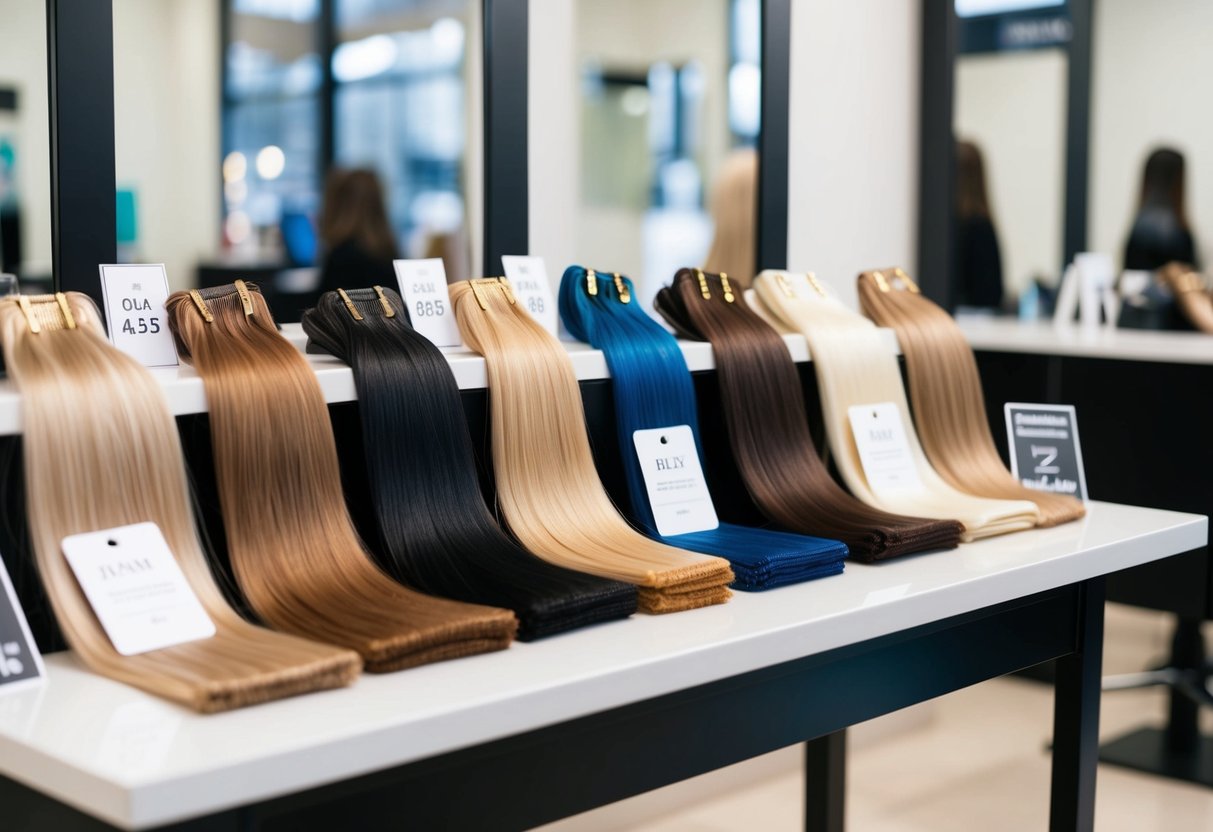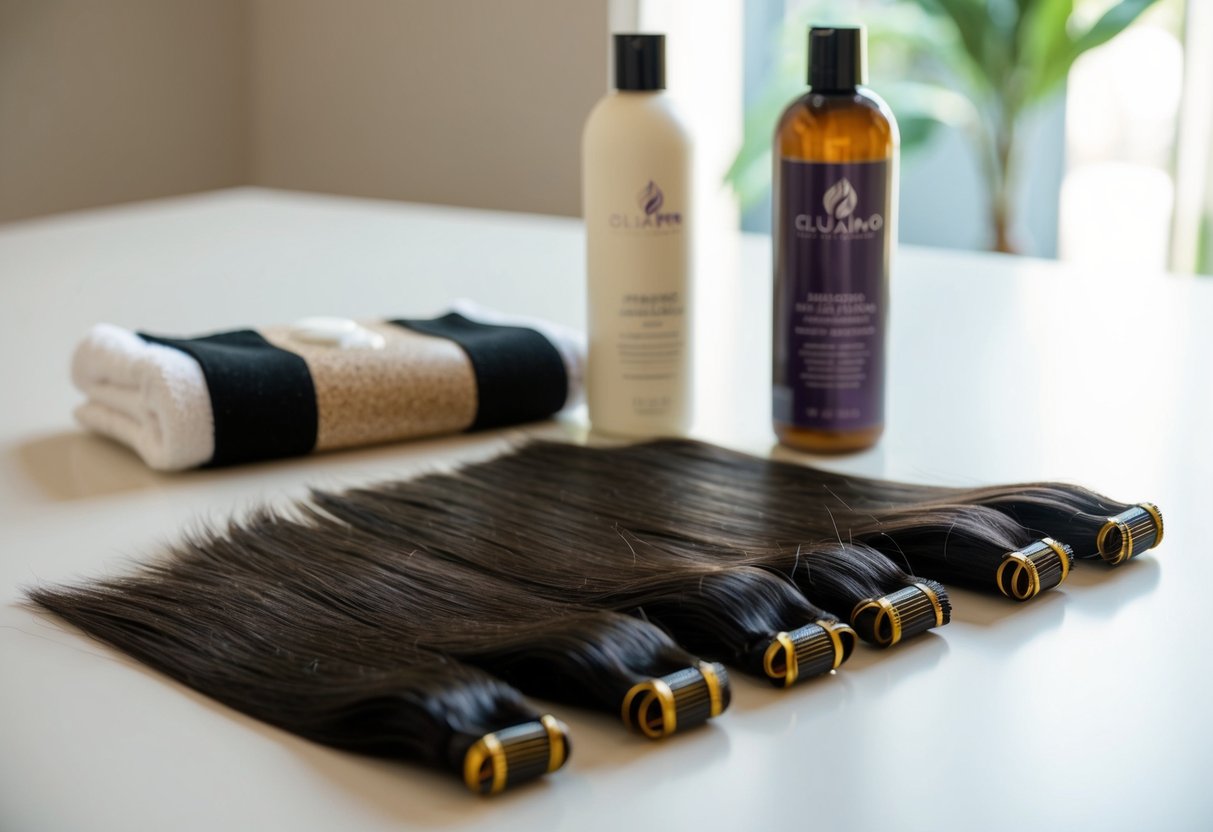The Ethical Dilemma: Is it Wrong to Use Human Hair for Extensions?

Key Takeaways
- Ethical Sourcing Matters: The origin and collection methods of human hair for extensions are crucial to ensuring ethical practices.
- Vendor Code of Conduct: USA Hair enforces a strict vendor code of conduct to maintain ethical standards throughout the supply chain.
- Fair Compensation: Ensuring donors are fairly compensated is a core aspect of ethical hair sourcing.
- No Forced or Child Labor: USA Hair has a zero-tolerance policy for forced or child labor.
- Safe Working Conditions: Our vendors must provide safe, healthy, and sanitary working environments.
- Transparency: USA Hair maintains transparency in its supply chain, allowing customers to make informed, ethical choices.
- Quality Assurance: Ethically sourced hair is often of higher quality due to the respectful and careful collection processes.
- Supporting Ethical Practices: By choosing USA Hair, customers support fair labor practices and environmental sustainability.
- Positive Brand Image: Promoting and using ethical products enhances reputations and shows a commitment to social responsibility.
- Peace of Mind: Customers can enjoy luxurious hair extensions with the confidence that they are ethically sourced.
Introduction
The debate surrounding the use of human hair for extensions often centers on ethical concerns. Many wonder whether it is morally acceptable to use human hair, questioning the sources and the conditions under which the hair is collected. In this blog post, we will delve into this ethical dilemma and explain why, when buying from reputable sellers like USA Hair, the answer is a definitive no to any ethical wrongdoing. At USA Hair, we are committed to providing only ethically sourced hair extensions, ensuring fair treatment and respect for all involved in the supply chain. Our strict vendor code of conduct underscores our dedication to maintaining the highest ethical standards in the industry.
Understanding the Ethical Dilemma
The Origins of Human Hair for Extensions
Human hair for extensions is sourced from various parts of the world, often from countries with high populations and significant economic disparities. The primary sources include countries in Asia, such as India and China, as well as Eastern Europe and South America. Hair is collected through different methods, including donations at temples, individual sales, and hair collected from salons and hairbrushes.
Ethical Concerns Surrounding Human Hair Extensions
The ethical concerns arise from the methods and conditions under which the hair is collected. Some of the primary issues include:
- Exploitation: There are instances where individuals, often in economically disadvantaged situations, are coerced or misled into selling their hair for minimal compensation.
- Transparency: The lack of transparency in the supply chain makes it difficult for consumers to know the true origin of the hair and the conditions under which it was sourced.
- Labor Practices: There are concerns about the treatment of workers involved in the collection, processing, and manufacturing of hair extensions, including the potential for child labor, forced labor, and unsafe working conditions.
These ethical concerns highlight the importance of ensuring that the hair used for extensions is sourced responsibly and ethically.
The Importance of Ethical Hair Sourcing
Defining Ethical Hair
Ethical hair sourcing involves ensuring that all hair used in extensions is obtained through fair and transparent practices. This means that the hair is collected with the full consent of the donor, who is compensated fairly, and that all labor involved in the processing and manufacturing of the hair extensions adheres to strict ethical standards. Ethical hair sourcing also includes environmental responsibility and the commitment to not harm the communities from which the hair is sourced.
The Impact of Unethical Hair Practices
Unethical hair sourcing can have significant negative impacts, including:
- Exploitation of Vulnerable Populations: Individuals in economically disadvantaged situations can be exploited, receiving little to no compensation for their hair.
- Poor Working Conditions: Workers involved in the hair processing industry may be subjected to unsafe and unhealthy working conditions, low wages, and long hours.
- Lack of Transparency: The absence of transparency in the supply chain can lead to consumers unknowingly supporting unethical practices.
- Negative Environmental Impact: Unethical practices may not take into account the environmental footprint of hair sourcing and processing, leading to harm to local ecosystems.
By choosing ethically sourced hair, consumers can help to promote fair practices and support the well-being of those involved in the hair extension industry.
Our Commitment to Ethical Hair
USA Hair's Vendor Code of Conduct
At USA Hair, we take our commitment to ethical practices seriously. Our vendor code of conduct ensures that all our suppliers adhere to the highest ethical standards. Here’s an overview of our code:
Compliance with Laws and Regulations
Our vendors must comply with all applicable laws and regulations in the countries where they operate. This includes labor laws, environmental regulations, and anti-corruption laws. Vendors must conduct their business ethically, without engaging in corrupt practices such as bribery or extortion.
Respectful Workplaces
No Forced Labor
Employment must be freely chosen. Our vendors are prohibited from using forced, bonded, or indentured labor, and must not restrict workers' movement by withholding identification papers or wages.
No Child Labor
Vendors must not employ children. Workers must be at least 15 years old or meet the minimum age requirement by local law, whichever is greater. Vendors must ensure that young workers are not assigned hazardous tasks.
No Abuse and Unfair Disciplinary Measures
Every worker must be treated with respect and dignity. Vendors are prohibited from using corporal punishment, coercion, or harassment of any kind. Disciplinary practices must be fair and clearly communicated.
Fair Treatment of Workers
No Excessive Working Hours
Vendors must comply with laws regarding working hours. Workers should not exceed 60 hours per week and must receive at least one day off per seven-day period. Overtime must be consensual and compensated at the legal rate.
Regular Employment
Employment relationships must be clearly defined with written contracts. Workers must be informed of their legal rights and obligations in their local language.
No Discrimination
Vendors must ensure there is no discrimination based on race, nationality, gender, religion, disability, or any other protected characteristic. Foreign and migrant workers must be treated equally.
Compensation & Benefits
Vendors must pay wages and benefits that meet legal standards and ensure timely payments. Workers should not incur recruitment fees or debt as a condition of employment.
Freedom of Association
Workers must have the right to join associations of their choice. Vendors must respect the right to collective bargaining and implement effective grievance mechanisms.
Health & Safety as a Priority
Safe, Healthy, and Sanitary Working Conditions
Vendors must provide a safe working environment that complies with all health and safety regulations. This includes proper fire prevention, emergency plans, ventilation, lighting, and access to potable water.
Environmentally Responsible Practices
Protection of the Environment
Vendors must comply with environmental laws and strive to minimize their environmental impact. This includes managing waste, hazardous materials, and reducing their carbon footprint.
Collaborative Partnerships
Confidential and Proprietary Information
Vendors must protect confidential and proprietary information and respect intellectual property rights.
Effective Management Systems
Vendors must establish documented policies and procedures to ensure compliance with this code. Responsibilities must be clearly assigned and communicated to all employees.
Subcontracting
Vendors may not subcontract without prior written consent and must ensure that subcontractors comply with this code.
Compliance & Grievance Mechanisms
Vendors must maintain documentation to demonstrate compliance and allow for inspections. Non-compliance will result in corrective action or termination of the business relationship.
By adhering to this comprehensive code of conduct, USA Hair ensures that all our hair extensions are ethically sourced, supporting fair labor practices and environmental sustainability.
How to Identify Ethical Hair Extensions
Key Indicators of Ethical Hair
When choosing hair extensions, it is important to look for key indicators that the hair has been sourced ethically. Here are some signs to help you identify ethical hair extensions:
- Transparent Supply Chain: Ethical hair suppliers will provide clear information about the origin of their hair, including where and how it was collected.
- Fair Compensation: Donors should be fairly compensated for their hair. Reputable suppliers will ensure that the hair donors receive a fair price.
- Labor Practices: The supplier should follow fair labor practices, ensuring safe working conditions, reasonable working hours, and no use of forced or child labor.
- Certifications: Look for suppliers who have certifications from recognized ethical bodies or who adhere to well-known ethical standards.
- Supplier Reputation: Choose suppliers with a good reputation for ethical practices. Reviews and testimonials can provide insights into the company’s ethical commitments.
Questions to Ask Your Supplier
To ensure that you are purchasing ethically sourced hair, consider asking your supplier the following questions:
-
Where is the hair sourced from? Understanding the geographical origin of the hair can provide insights into the sourcing practices.
-
How are the hair donors compensated? Ensure that the donors are receiving fair compensation for their contributions.
-
What labor practices are followed in your supply chain? Confirm that the supplier adheres to fair labor practices and does not engage in exploitation or unsafe working conditions.
-
Do you have any ethical certifications? Certifications from ethical organizations can provide additional assurance of the supplier’s commitment to ethical practices.
-
Can you provide details about your supply chain transparency? Ethical suppliers should be open about their supply chain and willing to provide detailed information.
By asking these questions, you can make informed decisions and choose hair extensions that align with your values and ethical standards.
Why Choose USA Hair
Our Ethical Standards
At USA Hair, we are committed to maintaining the highest ethical standards in the industry. Here’s why choosing our hair extensions ensures you are supporting ethical practices:
- Strict Vendor Code of Conduct: We enforce a comprehensive vendor code of conduct that ensures fair labor practices, environmental responsibility, and respect for workers' rights. Our vendors must comply with all applicable laws and regulations, and we conduct regular audits to ensure ongoing compliance.
- Fair Compensation: We ensure that all hair donors are fairly compensated for their contributions, promoting economic fairness and respect for their rights.
- Safe Working Conditions: Our vendors must provide safe, healthy, and sanitary working conditions for all workers, adhering to strict health and safety regulations.
- No Forced or Child Labor: We have a zero-tolerance policy for forced or child labor. Employment must be freely chosen, and workers must be of legal working age and not subjected to any form of coercion or abuse.
- Transparency and Traceability: We maintain transparency in our supply chain, providing detailed information about the origin and processing of our hair extensions. This allows our customers to make informed choices and trust the ethical sourcing of our products.
Benefits of Choosing Ethical Hair Extensions
By choosing ethically sourced hair extensions from USA Hair, you not only support fair and responsible practices but also enjoy several benefits:
- Quality Assurance: Ethically sourced hair is often of higher quality, as it is collected and processed with care and respect for the donor.
- Peace of Mind: Knowing that your hair extensions are sourced ethically gives you peace of mind and aligns with your values of fairness and responsibility.
- Supporting Ethical Practices: Your purchase supports fair labor practices, helps combat exploitation, and promotes better working conditions and environmental sustainability.
- Positive Brand Image: Using and promoting ethical products enhances your personal or business reputation, showing your commitment to social responsibility.
Choosing USA Hair means choosing a brand dedicated to ethical sourcing and high-quality hair extensions. Our commitment to ethical practices ensures that you can enjoy beautiful, luxurious hair extensions without compromising your values.
Conclusion
The ethical concerns surrounding the use of human hair for extensions are significant, but they can be addressed by choosing reputable suppliers who adhere to strict ethical standards. At USA Hair, we are dedicated to ensuring that all our hair extensions are sourced responsibly and ethically. Our comprehensive vendor code of conduct guarantees fair labor practices, environmental responsibility, and respect for all individuals involved in the supply chain.
When you choose USA Hair, you are not only getting high-quality hair extensions but also supporting ethical practices that promote fairness, transparency, and sustainability. By making informed choices and prioritizing ethical sourcing, we can collectively contribute to a more ethical and responsible hair extension industry.
FAQ
-
What is ethical hair sourcing? Ethical hair sourcing involves collecting hair through fair and transparent practices, ensuring donors are compensated fairly, and adhering to ethical labor standards.
-
Why is it important to buy ethically sourced hair extensions? Buying ethically sourced hair extensions supports fair labor practices, prevents exploitation, and promotes environmental sustainability.
-
How does USA Hair ensure the ethical sourcing of hair? USA Hair enforces a strict vendor code of conduct, conducts regular audits, and maintains transparency in its supply chain to ensure ethical sourcing.
-
What does USA Hair's vendor code of conduct include? The code includes compliance with laws, fair labor practices, safe working conditions, no forced or child labor, environmental responsibility, and transparency.
-
How can I verify the ethical sourcing of hair extensions? Ask suppliers about their sourcing practices, labor conditions, certifications, and supply chain transparency.
-
What are the benefits of using ethically sourced hair extensions? Benefits include higher quality hair, peace of mind, supporting ethical practices, and enhancing your brand’s reputation.
-
Does USA Hair use child labor in its supply chain? No, USA Hair has a zero-tolerance policy for child labor and ensures all workers are of legal working age.
-
Are hair donors fairly compensated by USA Hair? Yes, USA Hair ensures all hair donors are fairly compensated for their contributions.
-
What steps does USA Hair take to ensure safe working conditions? Our vendors must comply with health and safety regulations, provide safe and sanitary working environments, and conduct regular safety training.
-
How can I learn more about USA Hair's ethical practices? Visit our website for detailed information on our vendor code of conduct and our commitment to ethical sourcing.







